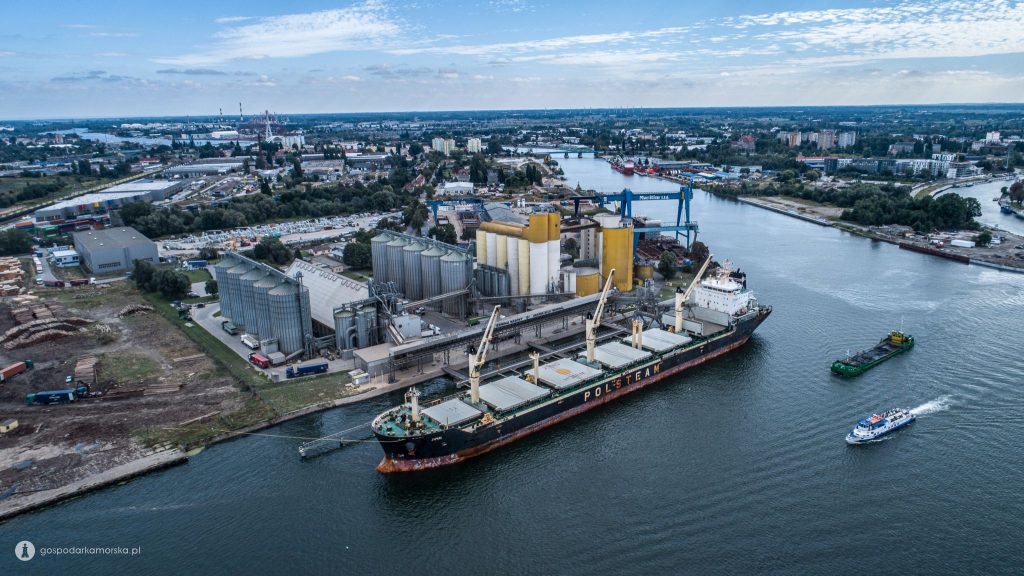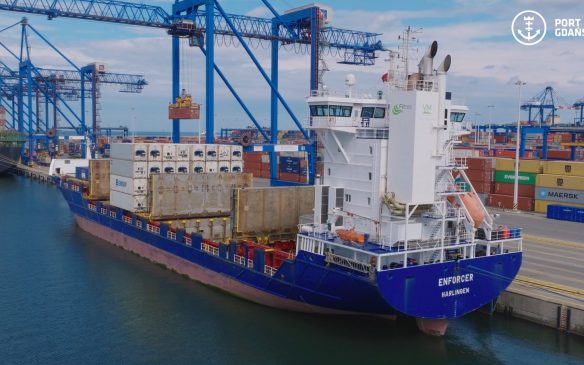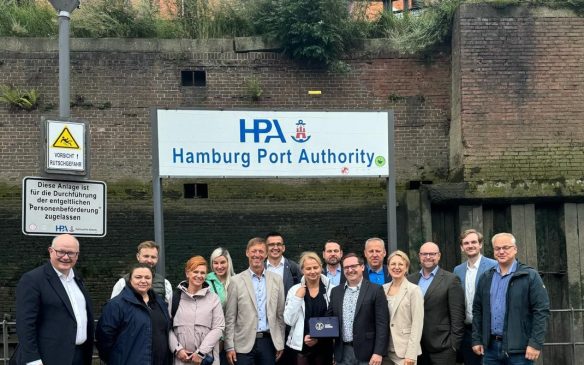Agricultural exports at Port of Gdańsk – the peak of the grain season is upon us

Poland is currently one of Europe’s leading food producers in terms of exports of apples, poultry and grain. As the largest cargo port in the country, the Port of Gdańsk plays a key role in the efficient and safe transport of these products to foreign markets. The port remains in full operational readiness during the harvest season, thanks to its modern infrastructure and investments in logistics.
Grain is the second largest cargo group in the Port of Gdańsk, after energy-based raw materials, and is of strategic importance to the economy. Unlike oil and coal, it is mainly exported, so the operation of the grain terminals is of paramount importance in terms of supporting Polish production and exports. Ships carrying Polish grain (corn, wheat, bran, rye, barley and oilseeds) sail to ports in Spain, the Netherlands, Great Britain, North and West Africa, as well as India and China, to name but a few destinations.
The harvest season is typically a time of increased traffic in the agricultural cargo sector, and for Polish agricultural producers and exporters, the Port of Gdańsk is a key link in the supply chain. Like other ports of key importance to the economy, it handles Polish crop exports all year round.
‘Despite the fact that grain terminals are currently less busy and cargo handling capacity was at around 50% in the first half of the year, the Port of Gdańsk is not slowing down’, says Bartosz Bloch, Commercial Director at ZMPG SA. ‘The terminals operating in our port continue to invest in increasing their cargo handling capacity, so that not only all Polish exports, but also large quantities of grain from neighbouring countries, can be handled in Polish ports.
In the first half of 2025, just over 1.1 million tonnes of grain passed through the port (compared to 1.5 million tonnes in the same period last year), loaded onto 212 ships. As far as land traffic is concerned, approximately 39,000 trucks with grain have been unloaded since the beginning of the year while rail traffic has handled 380 wagons with grain.
Grain handling in the Port of Gdańsk is carried out by the 9 terminals operating at Bytomskie Quay, Szczecińskie and Wiślane Quays, Oliwskie Quay, Zbożowe Quay and Przemysłowe Quay. They offer modern technological facilities, high operational efficiency and professional handling of agricultural cargo. These factors determine not only efficient logistics, but also the competitiveness of Polish exports on the global markets.
The modern Vehicle Traffic Notification System (SARP), which aims to improve car logistics within the port, is worth mentioning as one of the initiatives currently under development in the Port of Gdańsk. This new solution is expected to reduce truck waiting times, minimise congestion and optimise the use of the road and cargo handling infrastructure. Buffer areas for trucks have also been prepared within the port, with ‘parking spaces’ located on the following streets: Budowniczych Portu Północnego, Ku Ujściu, Załogowa, Śnieżna, Wielopole and Wiślna. In total, there are about a thousand spaces’.
The port supports the Polish agricultural sector – including through new investments
In light of the global climate, geopolitical and economic changes, it can be seen that food security is becoming an increasingly important part of the national and international policies. As a modern cargo handling hub, the Port of Gdańsk has been actively involved in this trend by supporting the export and development of Polish agriculture.
‘The grain market is currently characterised by exceptional volatility – we are seeing significant fluctuations in volumes and export destinations, resulting from both the geopolitical situation and the pressure of climate change. We have decided to invest in the Gdańsk Agro Terminal in view of this volatility. This investment is not only going to increase our cargo handling capacity, but primarily ensure the real operational resilience of the Port of Gdańsk to fluctuations in supply and demand in the agri-food sector’, said Andrzej Kuźmicz, president of Port Gdański Eksploatacja, a company operating in the Inner Port and involved in things like grain handling. ‘We want to be a reliable, predictable and efficient partner for farmers and exporters, capable of coping not only with seasonal challenges, but also with the long-term food export development strategy.


